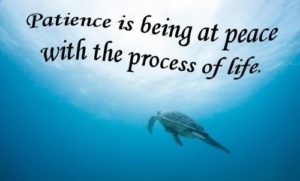 Are the changes you want to make taking too long? If so, consider this –
Are the changes you want to make taking too long? If so, consider this –
Cognitive neuroscience considers “patience” to be a decision-making dilemma. Having the option, research shows that all animals, including humans, tend to favor short-term rewards over long-term rewards; even if the greater benefit is associated with the long term reward. Patience is about perseverance and steadfastness – waiting for the long term reward – often at the most difficult times. It requires accessing our capabilities beyond our instinctive survival mechanisms – activating our ability to choose from a higher instinct, a greater wisdom.
Please consider how instant gratification – the opposite of delayed gratification (patience) – has made us more vulnerable to anxiety, depression, rage, and addictions. We’ve bought a cultural illusion that all good things should come quickly, easily, effortlessly, and with little investment. Buy now, pay later. We’re told we deserve immediate satisfaction – thus connecting instant pleasure with self worth. Delay, then, becomes a personal assault. Consider this next time you’re caught in a traffic jam, and listen to the messages inside your own head about what you believe you deserve. Damn that inconvenient delay!
You’ve heard me say, no matter what our age, we’re all still growing and growing up. We’re in a process of maturation, and it’s not a point of arrival – it’s the journey of life. This is especially true about patience. We mature into patience, because we discover it makes the most sense, for lots of reasons.
(And, by the way, peace is not a point of arrival. It, too, is a process of adjusting our perceptions and beliefs. The more we hang in it, the more we want peace. And the more we hang in peace and want peace, the easier it becomes; like most things in life actually. Pleace-fullness is a process we practice. Some days and moments are better than others.)
Living and learning takes time. Some things are learned more easily than others. Some rewards come more quickly than others. So what happens, then, when we don’t get what we want right away? What happens inside when we become frustrated and impatient with life or with ourselves?
Impatience disrupts our well-being. It causes us to makes poor decisions. Impatience affects our health. Impatience causes us to be judgmental with others and ourselves.
Patience, on the other hand, is about accepting life as it is; choosing to rest, instead of struggle. This is not passivity but rather about dynamic resilience – the ability to stay the course without resistance – to go with the flow . . . of life.
Patience is extending empathy toward your Self and speaking kindly to your Self, especially when there is a delay or setback. Refrain from self-criticism. Self-criticism is not your friend; no purpose is served in demeaning your Self. Shaming your Self will not motivate you nor will it change what is outside your responsibility, capability, or control. Re-frame your thoughts, and speak gently to your Self. Soothing words are healing and uplifting. It’s what you’d extend to a good friend; likewise, extend this same care to your Self.
Patience requires affirming of your own value; the value of your life and of your heart’s desires – just as you are; validating your worthiness of love, support, encouragement, and sustenance, even as you wait for the desired outcome.
As St. Francis de Sales says, “Have patience with all things, but first of all, with yourself.”


